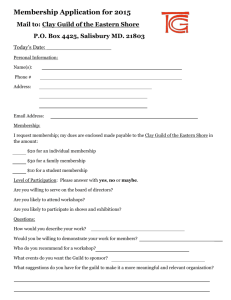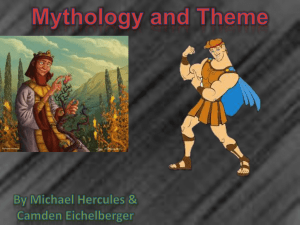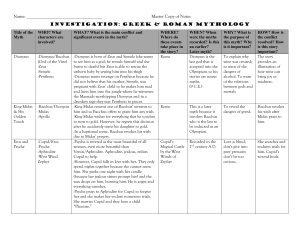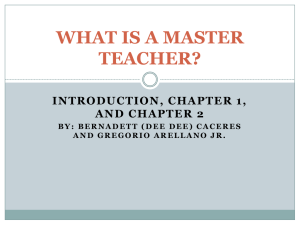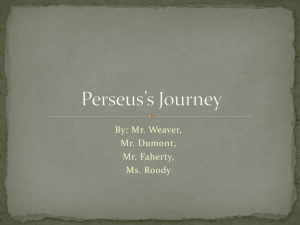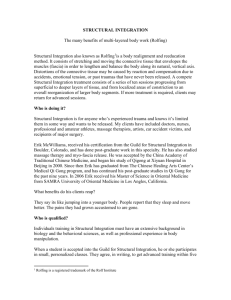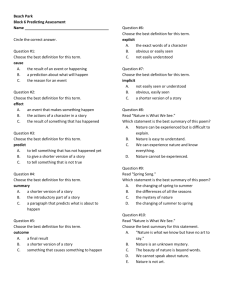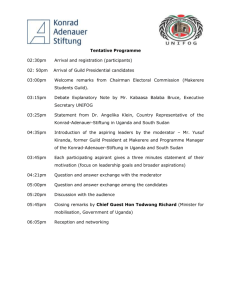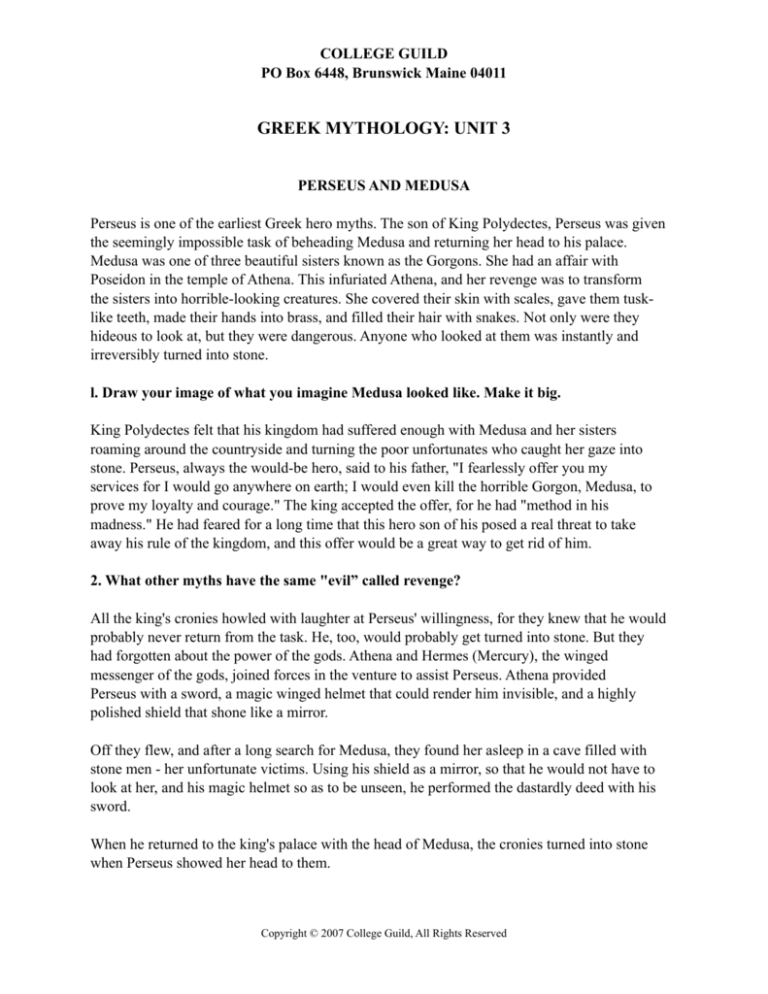
COLLEGE GUILD
PO Box 6448, Brunswick Maine 04011
GREEK MYTHOLOGY: UNIT 3
PERSEUS AND MEDUSA
Perseus is one of the earliest Greek hero myths. The son of King Polydectes, Perseus was given
the seemingly impossible task of beheading Medusa and returning her head to his palace.
Medusa was one of three beautiful sisters known as the Gorgons. She had an affair with
Poseidon in the temple of Athena. This infuriated Athena, and her revenge was to transform
the sisters into horrible-looking creatures. She covered their skin with scales, gave them tusklike teeth, made their hands into brass, and filled their hair with snakes. Not only were they
hideous to look at, but they were dangerous. Anyone who looked at them was instantly and
irreversibly turned into stone.
l. Draw your image of what you imagine Medusa looked like. Make it big.
King Polydectes felt that his kingdom had suffered enough with Medusa and her sisters
roaming around the countryside and turning the poor unfortunates who caught her gaze into
stone. Perseus, always the would-be hero, said to his father, "I fearlessly offer you my
services for I would go anywhere on earth; I would even kill the horrible Gorgon, Medusa, to
prove my loyalty and courage." The king accepted the offer, for he had "method in his
madness." He had feared for a long time that this hero son of his posed a real threat to take
away his rule of the kingdom, and this offer would be a great way to get rid of him.
2. What other myths have the same "evil” called revenge?
All the king's cronies howled with laughter at Perseus' willingness, for they knew that he would
probably never return from the task. He, too, would probably get turned into stone. But they
had forgotten about the power of the gods. Athena and Hermes (Mercury), the winged
messenger of the gods, joined forces in the venture to assist Perseus. Athena provided
Perseus with a sword, a magic winged helmet that could render him invisible, and a highly
polished shield that shone like a mirror.
Off they flew, and after a long search for Medusa, they found her asleep in a cave filled with
stone men - her unfortunate victims. Using his shield as a mirror, so that he would not have to
look at her, and his magic helmet so as to be unseen, he performed the dastardly deed with his
sword.
When he returned to the king's palace with the head of Medusa, the cronies turned into stone
when Perseus showed her head to them.
Copyright © 2007 College Guild, All Rights Reserved
COLLEGE GUILD
PO Box 6448, Brunswick Maine 04011
Here is a great hero who perseveres to accomplish an obstacle (a task) that appeared to be
impossible. Any of the heroic deeds you have read about would have deterred even the
strongest-hearted would-be hero. We have to admit that Perseus did have divine assistance.
3. How does one overcome obstacles anyway? Have you ever encountered an obstacle
you couldn't overcome? Tell of your experience; or perhaps you know of on encounter that
had a successful outcome.
Tales from the past generally equate heroism with physical strength and raw courage - often
with divine assistance. Today's heroes do not always fit that old definition. New kinds of
heroism and new kinds of heroes have emerged. To many, research scientist Jonas Salk
(developer of the polio vaccine), astronaut John Glenn, and civil rights leader Martin Luther
King are contemporary heroes. And we have POWs, sport figures, and the list goes on.
4. What are some of the traits that make people heroes? Can anyone be a hero? Who
are your heroes? Write an essay (at least three paragraphs) on the subject of heroism.
Include examples of heroism.
POSEIDON (NEPTUNE)
Poseidon. brother of Zeus and Hades, was the king of the seas, earthquakes and, for the
Romans, horses. His famous symbol was the trident - his greatest weapon - a long spear with
three prongs. When angered, he was prone to strike the mountainside with the trident; this
then caused floods, earthquakes, shipwrecks and drownings. Once he tried to shipwreck
Odysseus and his crew on their way home to Greece from the Trojan War. More out of fear
than respect for Poseidon. sailors prayed to Poseidon for safe voyages, and they would even
throw a horse or two into the seas as a sacrifice. Some sources say that he was the most
infamous of all the gods. Funny thing - there was a moral code for mortals but none for the
gods themselves.
5. Trident gets its name from the Latin - "tri" rennin three, and "dens" meaning
tooth. Explain the following: triangle, trio, triennial, tricycle, tri-semester.
6. Add as many other words beginning with "tri" as you can - all relating to three. Use a
dictionary if you have access to one.
Copyright © 2007 College Guild, All Rights Reserved
COLLEGE GUILD
PO Box 6448, Brunswick Maine 04011
THE MIDAS TOUCH
Midas was a foolish king, not an arrogant one. Therefore, this myth is more humorous than
many of the Greek myths you have already read.
Dionysius, the god of wine, was being entertained at a banquet by King Midas. During the
course of the meal, Dionysius told the king to make a wish, "anything you want", he said, "and I
will grant it. And, furthermore,I will swear upon the waters of the River Styx,"
Well, how would you feel about a gift like that? King Midas was overjoyed at the thought and
replied, “Let everything my body touches turn into gold.” Although he thought the king showed
poor judgment, Dionysius granted the wish.
As he left the banquet, the king cautiously picked a branch from a nearby tree and, sure
enough, it turned into gold. Then he grabbed a little rock - a lump of gold. And so it went, all
the way back to the palace. The next morning, his servant served a delicious-looking meal, but
when he picked up his utensils to eat, everything turned into gold. His servants tried hard not
to laugh of the pitiful sight of their hungry master unable to eat. King Midas was parched with
thirst. He was starving for food. But his riches could not satisfy either. He then began to detest
the power he had acquired. Raising his hands to the gods, he prayed, 'O Dionysius, help
me! I have erred. I have used your generous gift unwisely. Pity me, and free me from this
golden curse."
The god did free Midas, because he pitied. He showed compassion. And so Midas hated his
wealth, which had only brought him pain and misery.
7. Do you think the king's judgment improved afterwards? Explain your answer.
8. Why do you think Midas is a foolish king?
Volumes have been written on money and its effects on individuals. The Bible addresses the
issue in two parables, and from it comes a well-known proverb: "The love of money is the root
of all evil."
I took the basic flow of this myth, not the wording. from "Mythology and You” by Rosenberg
and Baker, as well as the exact wording of the comments that follow, because they are so
appropriate to all of us: "The wish for wealth is a motivator for everyone to some extent. We
all have needs (food, shelter, clothing) and wants (luxuries). We know many people, however,
whose craving for gold (wealth) far exceeds their basic needs. Sometime.s they want wealth
for its own sake or to impress other people. It gives them a feeling of power, because they
assume that anything they want in life can be paid for with great wealth. Such persons are
Copyright © 2007 College Guild, All Rights Reserved
COLLEGE GUILD
PO Box 6448, Brunswick Maine 04011
called ‘materialists.’ They see wealth as power. They say: 'If I have money, I can have
everything.' What sometimes happens, however, is that they discover that wealth cannot buy
the things people really want, such as love. friendship, respect from others. or self-esteem."
Having things and experiencing feelings do not always go together. One can, like Midas, literally
starve for food (symbolically, food and love are substitutes for each other) while being able to
turn everything into gold. On an unconscious level, some people equate wealth and love.
Sometimes a person who only craves wealth really wants love and thinks that since he, himself ,
is not gifted in loving, he must be made more attractive through wealth. When this happens,
people feel hopelessly disconnected from their feelings and are unable to stop their incessant
gold-hunt. They may work hard, but find it difficult to find satisfaction in loving or to form
loving human relationships. They starve, as Midas did, for what they really need.
It is hoped that people like Midas will realize the shallowness of their lives. Sometimes they
never do.
The myth is also telling us something amusing. It was Midas' only wish, when he could have had
anything he wanted, that everything he touched turn to gold. Aren't the gods saying that when
we want something in excess of our needs. that wish has consequences that may lead to
punishment and suffering?
9. If you were granted one wish, what would it be?
10. Make a list of the products you see on TV or in magazines over a weekend. What
message do these ads reveal about the values of our society?
11. What do you view as the goal of most adults:
Money
Owning property
Fame
Being the 'boss"
More than one car
Having an important career
Other
Today the commonly used expression "midas touch" comes from the myth. It is the ability to
create wealth and success at every turn, and it is thus that we apply the phrase to individuals
who seem to succeed of every enterprise they undertake.
Copyright © 2007 College Guild, All Rights Reserved
COLLEGE GUILD
PO Box 6448, Brunswick Maine 04011
THESEUS - THE MINOTAUR - THE LABYRINTH
Theseus is considered to be the greatest Athenian hero. He possessed all the qualities the
Greeks looked for in their heroes: courage, compassion, having great strength, being clever.
His home was in the south of Greece. In search of his father, whom he had never met, he set
out on foot for Athens to meet him. At that time, the road to Athens was a dangerous route
because it was infested with robbers, villains, and criminals who roamed the area. The safest
way and the most traveled was by boat, but Theseus preferred to go on foot; he thought there
would be many heroic adventures waiting for a would-be hero. He was right. The Athenians
were terrorized for a long time by three 'monsters" who had "specialties."
One was Sinis. He fastened the victims he waylaid on the route by tying them to the branches
of young pine trees. Then he bent the branches back to the ground, letting the victims fly off
to their doom.
Next was Sciron, the bandit. who made his victims kneel before him at the edge of a cliff.
Then he kicked them over the cliff to their doom.
And last. but not least. was Procrustes (often referred to as the "stretcher").He invited
travelers to spend the night free of charge in his house. The problem was that he had only one
bed. If the guest was too tall for the bed, he was cut to size until he fit (this was probably the
first “one size fits all” ever invented): and the short guest was stretched till he fit.
The first heroic deed for Theseus was to dispose of Procrustes in the same manner in which
he treated his victims.
The word "procrustean" now means arbitrarily forcing someone into your way of thinking or
doing things. As an example: the grouping system in schools. where students with all different
levels of abilities are "lumped" together in their classes - the brightest to the slowest learners.
You can easily see who would be the victims in that scenario.
12. Were you ever a victim of that system in your high school days? Explain your answer.
(Use sentence form, please.)
I have often thought that the AA organization fell into that category, presenting the steps to
recovery with no consideration of individual differences or of problems facing those who
participated in the program.
13. Give an example of another "procrustean" method.
Copyright © 2007 College Guild, All Rights Reserved
COLLEGE GUILD
PO Box 6448, Brunswick Maine 04011
In the course of time, Theseus arrived in Athens. where another danger faced him. Medea, a
sorceress, knew that Theseus was the king's son (this was as yet unknown to him). Fearing she
would lose her influence on the king if Theseus should be acknowledged as his son, she tried to
poison him. Failing in that endeavor, she fled Athens, and Theseus was declared the rightful
successor to the throne.
14. Have you ever been in a situation where you tried to cover up something you did or
said, and it only made the matter worse? Explain your answer. (This is an optional
question - answer only if your care to share your experience.)
Now at this time the Athenians were faced with a dreadful problem. An unsuccessful war with
King Minos of Crete ended with the Athenians being forced into paying a tribute (payback) to
the king. Every year they had to send seven boys and seven girls to King Minos, and he threw
them into the labyrinth as food for the giant Minotaur (half man, half bull creature) caged inside.
It was common knowledge that no one could ever escape from this structure.
Theseus volunteered to be the champion of heroes and rid the city of Athens of the menace.
Ariadne, the daughter of King Minos, having fallen in love with Theseus, came to his aid. She
gave him a sword to kill the beast and a clue (a magic piece of string) by which he could find his
way out of the labyrinth. Theseus tied the clue at the entrance and unwound it as he searched
for the Minotaur. With the sword he slew the creature, and then retraced his way out. Grateful
crowds of Athenians greeted him upon his arrival back home.
The myth has given us the word labyrinth, which can mean a maze, a graphic puzzle, any
physical situation in which it is easy to get lost, or an intricate, usually confusing network from
one point to another.
Clew is an Old English word meaning "a ball of string." That word has gradually changed from
"clew” to “clue." The expression is now used to refer to any situation that leads to solving a
great mystery.
15. Write a descriptive sentence that illustrates any of the meanings of labyrinth.
16. Create, a "ball of string" mystery situation and tell how it was solved.
Labyrinths are very popular today. The ones used in churches are not considered mazes, as
they are not designed to make you lose your way, and they do not have multiple entrances and
exits. People who have walked a labyrinth say that it is a journey of peace and quiet, trusting
the path, and being receptive to your inner self, and that it refreshes then.
Copyright © 2007 College Guild, All Rights Reserved
COLLEGE GUILD
PO Box 6448, Brunswick Maine 04011
Hospitals sometimes use them for their patients. Cancer groups use them for strength and for
finding their way through difficult times. Hypertension (high blood pressure) clinics use them
to help their patients lower their stress levels.
Labyrinths are created in private backyards and outdoor ice-skating rinks; churches or other
meeting places use portable mats with labyrinth paths on them.
17. Describe in detail your own experience in a labyrinthine situation you have been in.
(My own example would be today's parking lots qt huge malls.)
DAEDALUS AND ICARU5
Daedalus was a master inventor, craftsman, and architect of his time, He had received this
gift from Athena, the goddess of wisdom, warfare and crafts. He was responsible for building
the labyrinth into which Theseus dared enter and kill the Minotaur. The king of Crete was
outraged and ordered Daedalus and his son,Icarus, imprisoned in the labyrinth.
While there, Daedalus plotted an escape by constructing wings out of feathers and wax which
would fly them to safety. Before they "took off ,’ he warned Icarus not to fly close to the sun.
But the young Icarus was so overwhelmed with the thrilling experience of flying that he paid
no attention to his father's warning: Icarus, my son, I charge you to keep at moderate height,
for if you fly too low, the damp will clog your wings, and if too high, the heat will melt them.”
Icarus flew too close. The sun melted the wax, and he fell into the sea.
Daedalus escaped to Sicily, and Hercules buried the body of Icarus. His body can be seen
today as a small rock promontory jutting out into the Aegean Sea; it is named ofter Icarus on
the island of Ikaria. It is a posh resort island for the wealthy.
18. What did you learn from this myth?
19. Daedalus was similar to Prometheus in what way?
20. Both Daedalus and Prometheus were clever and innovative. Whom do you prefer, and
why?
ATHENA
Athena, known as Minerva to the Romans, was the goddess of wisdom , warfare, and arts and
crafts. Her male counterpart was Ares (Mars). god of war. She is usually pictured with several
symbols: a helmet, a spear. her divine shield (called an aegis), and an owl, a symbol that is still
used today to represent wisdom.
Copyright © 2007 College Guild, All Rights Reserved
COLLEGE GUILD
PO Box 6448, Brunswick Maine 04011
Here is a simple, often repeated little poem, author unknown:
“A wise old owl lived in n oak.
The more he saw, the less he spoke.
The less he spoke, the more he heard.
Why can't we be like that wise old bird?"
Skilled in strategic warfare, Athena preferred negotiation to settle disputes, and went to war
only as a last resort. Ares, first and foremost a warrior, was the opposite in character. He
represented to the Greeks the worst aspects of war: brutality. rashness, and barbarism.
21. How has warfare changed over the ages, if at all? What lessons have we learned?
Write your thoughts on the subject. and cite examples to prove your way of thinking.
Athena was the favorite daughter of Zeus. Her "birth" was highly unusual. Once Zeus was
having a bad day of severe headaches. Hephaestus (Vulcan), the god of the forge, struck his
skull, and out sprang Athena completely dressed in her battle gear. Because of that unnatural
birth, she could never become a threat to her father and overthrow him. You will recall
previous gods who had the same fear of losing power.
Her favorite occupation was to assist Greek heroes in their exploits, offering them her advice,
assistance, and protection. Nike, the goddess of victory, often accompanied her.
Aegis is the name identified with the weapon system of the U.S. Navy. A class of ships, called
the Aegis destroyers, has strengthened our navy to cope with potential threats of the 21st
century. According to the Navy, "Aegis' is a most appropriate name for these destroyers that
are most able to defend our battle groups.
Copyright © 2007 College Guild, All Rights Reserved

